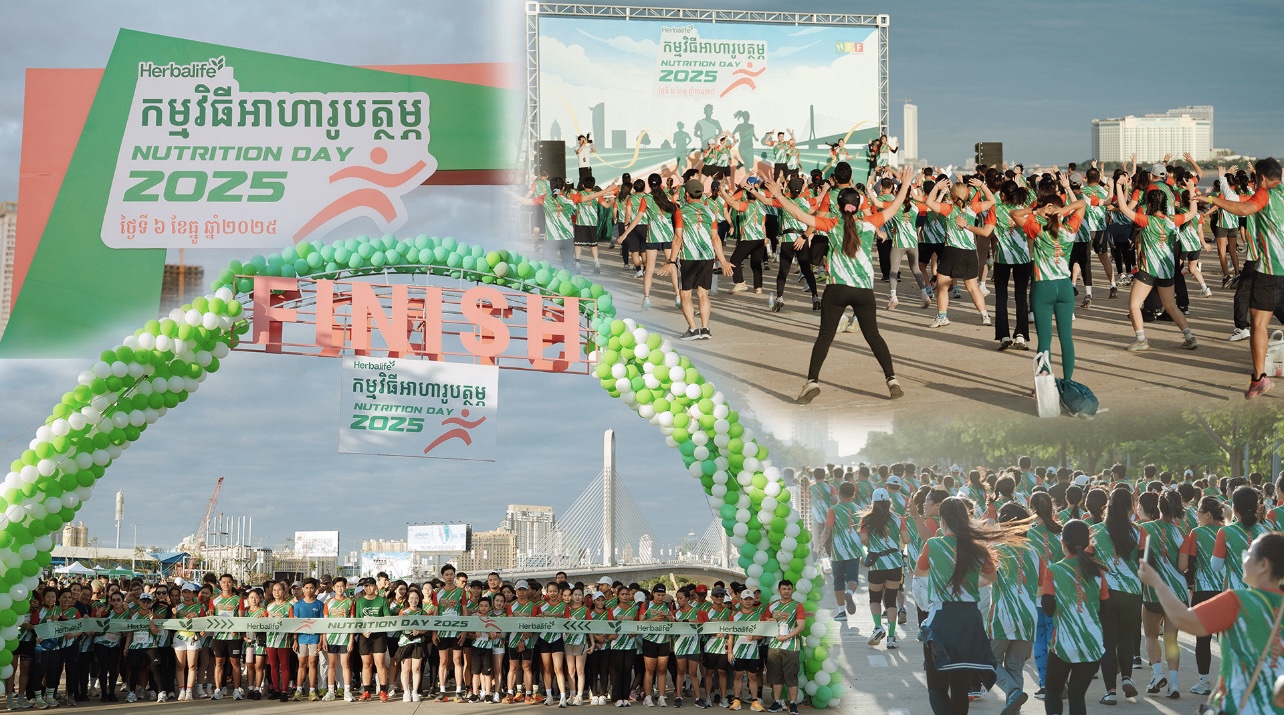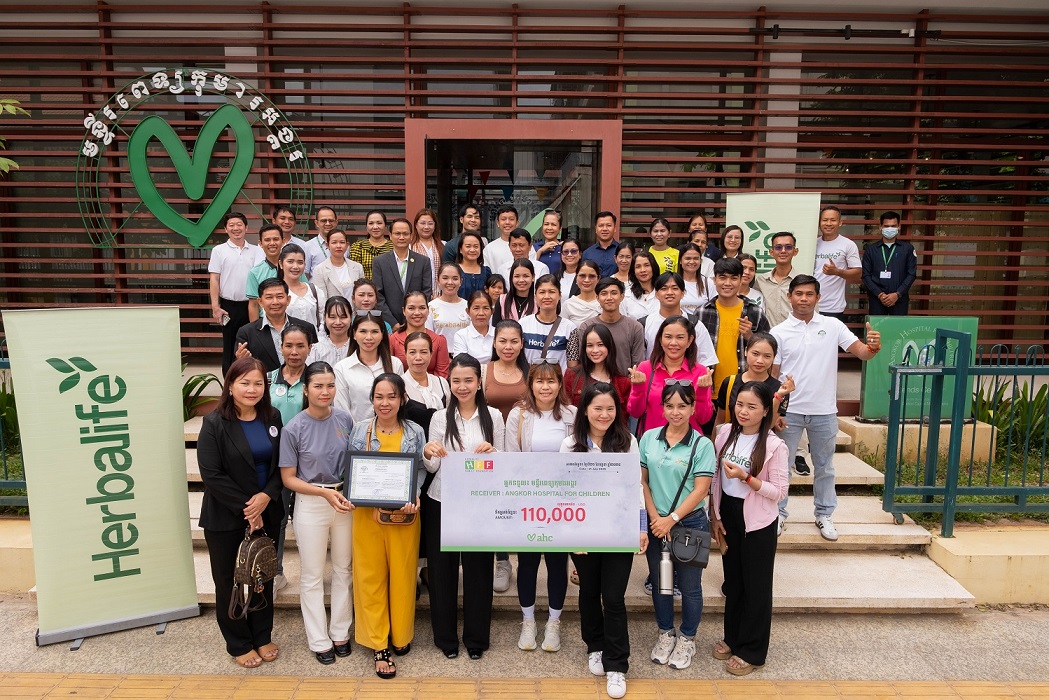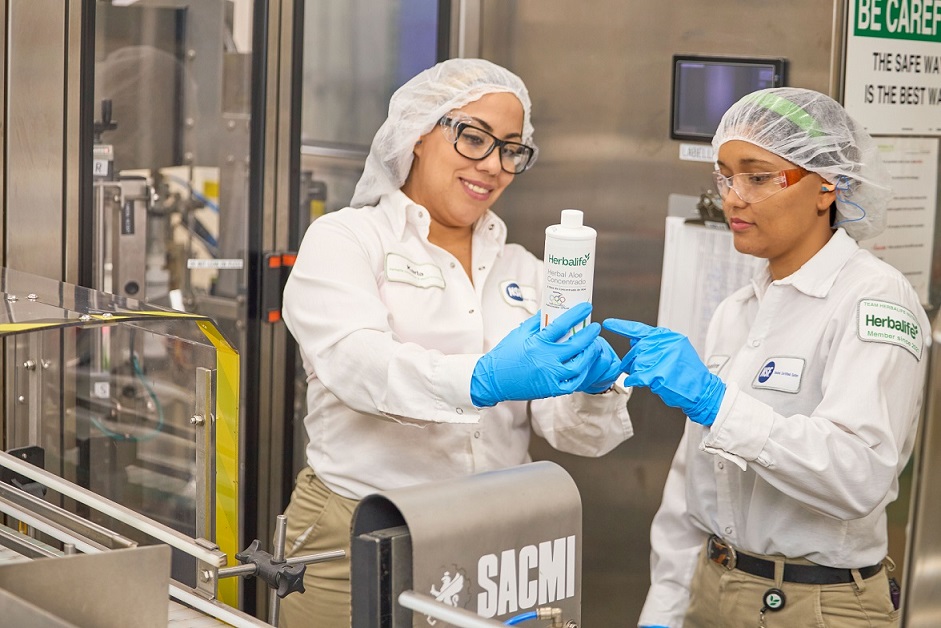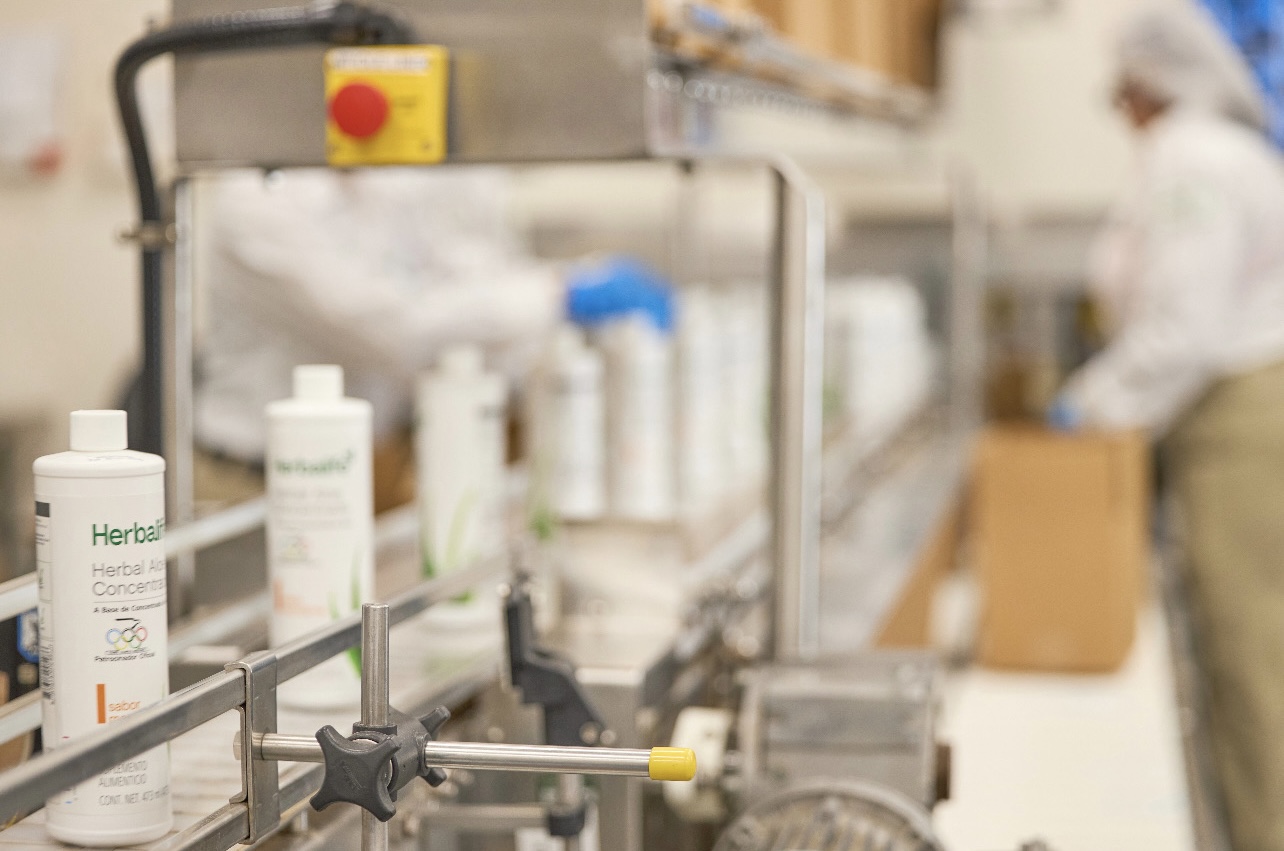
- Jan 21, 2026 |
- 4 weeks ago |
- 3K views
ការស្ទង់មតិរបស់ក្រុមហ៊ុន Herbalife បានរកឃើញថា សហគ្រិន ៣ ក្នុងចំណោម ៤ នាក់នៅក្នុងតំបន់អាស៊ីប៉ាស៊ីហ្វិក រំពឹងទុកថានឹងមានការកើនឡើងនូវសេដ្ឋកិច្ចក្នុងឆ្នាំ 2026
(ភ្នំពេញ)៖ Herbalife ដែលជាក្រុមហ៊ុន សហគមន៍ និងវេទិកាភ្ជាប់ទំនាក់ទំនង លំដាប់ថ្នាក់ពិភពលោក ផ្នែកសុខភាព និងសុខុមាលភាព បានចេញផ្សាយលទ្ធផលពីការស្ទង់មតិស្តីពីការផ្តល់អំណាចផ្នែកសុខភាព និងសេដ្ឋកិច្ចនៅក្នុងតំបន់អាស៊ីប៉ាស៊ីហ្វិក (APAC) ឆ្នាំ២០២៥ (Asia Pacific Health and Economic Empowerment Survey 2025)។ លទ្ធផលបានបង្ហាញពីសុទិដ្ឋិនិយមផ្នែកសេដ្ឋកិច្ចយ៉ាងខ្លាំងក្នុងចំណោមសហគ្រិន ដោយក្នុងនោះសហគ្រិន ៣ នាក់ក្នុងចំណោម ៤ នាក់ (៧៤%) រំពឹងថាសុខុមាលភាពសេដ្ឋកិច្ចរបស់ពួកគេនឹងប្រសើរឡើងក្នុងរយៈពេល ១២ ខែខាងមុខនេះ បើប្រៀបធៀបទៅនឹងអ្នកដែលមិនមែនជាសហគ្រិនដែលមានត្រឹមតែពាក់កណ្តាល (៤៨%) ប៉ុណ្ណោះ ដែលមានទស្សនៈដូចគ្នានេះ។ ការស្ទង់មតិនេះក៏បានបង្ហាញឱ្យឃើញពីកម្រិតនៃ 'ភាពម្ចាស់ការលើខ្លួនឯង' ទាំងផ្នែកសេដ្ឋកិច្ច និងសុខភាព ក្នុងចំណោមសហគ្រិន ដែលមានអត្រាខ្ពស់ជាងគួរឱ្យកត់សម្គាល់ បើធៀបនឹងអ្នកដែលមិនមែនជាសហគ្រិននៅក្នុងតំបន់។ 'ភាពម្ចាស់ការ' ត្រូវបានកំណត់ថាជាសមត្ថភាពក្នុងការធ្វើការសម្រេចចិត្តដោយផ្អែកលើព័ត៌មានច្បាស់លាស់ ដើម្បីពង្រឹងសុខុមាលភាពរាងកាយ ផ្លូវចិត្ត និងអារម្មណ៍ (ដែលសំដៅទៅលើ ភាពម្ចាស់ការផ្នែកសុខភាព) និងការកែលម្អស្ថានភាពហិរញ្ញវត្ថុរបស់បុគ្គលម្នាក់ៗ (ដែលសំដៅទៅលើ ភាពម្ចាស់ការផ្នែកសេដ្ឋកិច្ច) ដែលកម្រិតទាំងនេះមានខ្ពស់ជាង ១៧ ភាគរយ ក្នុងចំណោមសហគ្រិនដែលបានចូលរួមក្នុងការស្ទង់មតិ។ នេះបញ្ជាក់ឱ្យឃើញថាសហគ្រិនទាំងនោះមានការគ្រប់គ្រងសុខភាព និងសុខុមាលភាពសេដ្ឋកិច្ចរបស់ពួកគេបានល្អ។ លោក Thomas Harms នាយកគ្រប់គ្រងប្រចាំតំបន់អាស៊ីប៉ាស៊ីហ្វិកនៃក្រុមហ៊ុន Herbalife បានមានប្រសាសន៍ថា “ផ្ទុយទៅនឹងជំនឿដ៏ពេញនិយមដែលថាសហគ្រិនភាពគឺពោរពេញទៅដោយស្ត្រេស បើយោងទៅតាមការស្ទង់មតិនេះបង្ហាញថាសហគ្រិន មានភាពសុទិដ្ឋិនិយមផ្នែកសេដ្ឋកិច្ច មានទំនុកចិត្ត និងមានម្ចាស់ការទៅលើហិរញ្ញវត្ថុច្បាស់លាស់។ នៅក្នុងស្ថានភាពសេដ្ឋកិច្ចបច្ចុប្បន្ន មនុស្សជាច្រើនកំពុងស្វែងរកមធ្យោបាយបង្កើតប្រភពចំណូលបន្ថែម។ ក្រុមហ៊ុន Herbalife ប្តេជ្ញាគាំទ្រពួកគេដោយជួយពង្រឹងសុខភាព និងសុខុមាលភាពរបស់ពួកគេ ព្រមទាំងផ្តល់ឱកាសសម្រាប់អ្នកដែលចង់បង្កើតអាជីវកម្មសម្រាប់ខ្លួនឯង ក្នុងនាមជាអ្នកចែកចាយឯករាជ្យ”។ ការស្ទង់មតិនេះត្រូវបានធ្វើឡើងក្នុងខែតុលា ដោយមានអ្នកចូលរួម ៨,៥០៥ នាក់ (ក្នុងនោះមានសហគ្រិន ២,២៤៥ នាក់) មកពី ១១ ប្រទេសក្នុងតំបន់រួមមាន៖ អូស្ត្រាលី ហុងកុង ឥណ្ឌូនេស៊ី ជប៉ុន កូរ៉េ ម៉ាឡេស៊ី ហ្វីលីពីន សិង្ហបុរី តៃវ៉ាន់ ថៃ និងវៀតណាម។ សហគ្រិនបង្ហាញទំនុកចិត្តខ្ពស់លើសុខុមាលភាពសេដ្ឋកិច្ចរបស់ខ្លួន នៅទូទាំងតំបន់ សហគ្រិនមានទំនោរមើលឃើញស្ថានភាពសេដ្ឋកិច្ចរបស់ពួកគេក្នុងផ្លូវវិជ្ជមាន។ ក្នុងនោះមានសហគ្រិន ៤៣% បានវាយតម្លៃស្ថានភាពសេដ្ឋកិច្ចបច្ចុប្បន្នរបស់ពួកគេថាស្ថិតក្នុងកម្រិត "ល្អ" ខណៈដែលអ្នកមិនមែនជាសហគ្រិនមានត្រឹមតែ ២៥% ប៉ុណ្ណោះដែលយល់ឃើញបែបនេះ។ ចំពោះការរំពឹងទុកទៅថ្ងៃមុខវិញ សហគ្រិនរហូតដល់ ៧៤% រំពឹងថាស្ថានភាពសេដ្ឋកិច្ចរបស់ពួកគេនឹងប្រសើរឡើងក្នុងរយៈពេល ១២ ខែខាងមុខ ក្នុងពេលដែលអ្នកមិនមែនជាសហគ្រិនមានចំនួនមិនដល់ពាក់កណ្តាល (៤៨%) ផង ដែលមានទំនុកចិត្តក្នុងកម្រិតដូចគ្នានេះ។ បុគ្គលដែលជាសហគ្រិនក៏បានបង្ហាញសុទិដ្ឋិនិយមផងដែរ ក្នុងការសម្រេចឱ្យបាននូវគោលដៅរបស់ពួកគេ៖ គោលដៅរយៈពេលខ្លី (១២ ខែ)៖ ពាក់កណ្តាលនៃសហគ្រិន (៥០%) មានទំនុកចិត្តថានឹងសម្រេចបានគោលដៅសេដ្ឋកិច្ចរបស់ខ្លួន ដែលចំនួននេះខ្ពស់ជាងអ្នកមិនមែនជាសហគ្រិនរហូតដល់ ២៣ ភាគរយ។ គោលដៅរយៈពេលវែង (៥ ឆ្នាំ)៖ ៥១% នៃសហគ្រិនមានទំនុកចិត្តថានឹងសម្រេចបានគោលដៅក្នុងរយៈពេល ៥ ឆ្នាំខាងមុខ ដែលខ្ពស់ជាងអ្នកដែលមិនមែនជាសហគ្រិនចំនួន ២១ ភាគរយ។ ភាពម្ចាស់ការលើខ្លួនឯង ទាំងផ្នែកសេដ្ឋកិច្ច និងសុខភាពក្នុងចំណោមសហគ្រិនក្នុងតំបន់អាស៊ីប៉ាស៊ីហ្វិក ក្រៅពីភាពជឿជាក់ និងសុទិដ្ឋិនិយមចំពោះស្ថានភាពសេដ្ឋកិច្ចបច្ចុប្បន្ន និងទៅថ្ងៃអនាគត លទ្ធផលក៏បានបង្ហាញផងដែរថា សហគ្រិនក្នុងតំបន់អាស៊ីប៉ាស៊ីហ្វិកមាន "ភាពម្ចាស់ការលើខ្លួនឯង" ទាំងផ្នែកសេដ្ឋកិច្ច និងសុខភាព។ ៦ នាក់ ក្នុងចំណោម ១០ នាក់ ឬស្មើរនឹង ៥៩% នៃសហគ្រិនដែលចូលរួមការអង្កេតនេះបាននិយាយថា ពួកគេយល់ថាខ្លួនមានសមត្ថភាពជាម្ចាស់ការក្នុងការសម្រេចចិត្ត ដើម្បីកែលម្អស្ថិរភាពហិរញ្ញវត្ថុ និងសុខុមាលភាពសេដ្ឋកិច្ចរបស់ខ្លួន ដែលចំនួននេះគឺខ្ពស់ជាង ១៨ ភាគរយ បើធៀបទៅនឹងអ្នកមិនមែនជាសហគ្រិនដែលមានត្រឹម ៣៩%។ ភាពម្ចាស់ការលើផ្នែកសុខភាពក៏មានកម្រិតខ្ពស់ដូចគ្នាដែរក្នុងចំណោមសហគ្រិន ដោយមានរហូតដល់ ៦៥% ដែលយល់ថាខ្លួនមានសមត្ថភាពម្ចាស់ការលើខ្លួនឯង បើធៀបនឹងអ្នកមិនមែនជាសហគ្រិនដែលមានត្រឹមតែ ៤៨%។ ភាពម្ចាស់ការលើខ្លួនឯងនេះហើយ ដែលអាចពន្យល់បានថា ហេតុអ្វីបានជាសហគ្រិនបង្ហាញទំនុកចិត្តខ្ពស់ក្នុងការសម្រេចឱ្យបាននូវគោលដៅសុខភាពរបស់ពួកគេក្នុងរយៈពេល ១២ ខែខាងមុខ។ ច្រើនជាងពាក់កណ្តាល (៥៦%) នៃសហគ្រិន ជឿជាក់ថាពួកគេអាចសម្រេចបាននូវគោលដៅសុខភាពក្នុងរយៈពេល ១២ ខែខាងមុខ ខណៈដែលអ្នកមិនមែនជាសហគ្រិនមានត្រឹមតែ ៣៣% ប៉ុណ្ណោះដែលជឿជាក់បែបនេះ។ ទំនាក់ទំនងរវាងសុខភាព និងសេដ្ឋកិច្ច ការរកឃើញនេះបង្ហាញឱ្យឃើញកាន់តែច្បាស់ពីចំណងទាក់ទងគ្នាយ៉ាងជិតស្និទ្ធនៃភាពជាម្ចាស់ការទៅលើ សុខភាព និង សេដ្ឋកិច្ច។ អ្នកដែលមានសមត្ថភាពពេញលេញក្នុងការពង្រឹងស្ថានភាពហិរញ្ញវត្ថុរបស់ខ្លួន ក៏ច្រើនតែមានទំនុកចិត្តខ្ពស់ក្នុងការថែទាំសុខភាពរបស់ពួកគេដូចគ្នា។ នេះមានន័យថាភាពជឿជាក់លើការគ្រប់គ្រងលុយកាក់ និងភាពជឿជាក់លើការគ្រប់គ្រងសុខភាព គឺតែងតែដើរទន្ទឹមគ្នា។ ដោយសារមានការម្ចាស់ការទៅលើការសម្រេចចិត្ត ការកំណត់គោលដៅ ការបែងចែកពេលវេលា និងធនធាន ព្រមទាំងជម្រើសនៃការរស់នៅ សហគ្រិនជឿជាក់ថាខ្លួនមានសក្ដានុពលដើម្បីធ្វើឱ្យបំណងប្រាថ្នាក្លាយជាការពិត។ ភាពម្ចាស់ការលើខ្លួនឯងនេះហើយដែលជួយបង្កើនទំនុកចិត្ត និងនាំមកនូវលទ្ធផលល្អទាំងផ្នែកសុខភាព និងសេដ្ឋកិច្ច។ វាជាភស្តុតាងបញ្ជាក់ថា នៅពេលដែលយើងចេះគ្រប់គ្រងការសម្រេចចិត្តលើសុខភាព និងសេដ្ឋកិច្ចដោយខ្លួនឯង យើងនឹងអាចផ្លាស់ប្តូរទាំងអនាគត និងជីវិតរស់នៅឱ្យកាន់តែប្រសើរឡើង។ អំពីក្រុមហ៊ុន Herbalife ក្រុមហ៊ុន Herbalife (NYSE: HLF) គឺជាក្រុមហ៊ុនសុខភាព និងសុខុមាលភាពឈានមុខគេ និងជាសហគមន៍ដែលកំពុងផ្លាស់ប្តូរជីវិតរបស់មនុស្សជាមួយនឹងផលិតផលអាហារូបត្ថម្ភដ៏អស្ចារ្យ និងជាឱកាសអាជីវកម្មសម្រាប់សមាជិកឯករាជ្យរបស់ខ្លួនចាប់តាំងពីឆ្នាំ 1980។ ក្រុមហ៊ុនផ្តល់ជូននូវផលិតផលដែលគាំទ្រដោយវិទ្យាសាស្រ្តដល់អ្នកប្រើប្រាស់នៅក្នុងទីផ្សារជាង 90។ តាមរយៈសមាជិកឯករាជ្យដែលផ្តល់ជូននូវការបណ្តុះបណ្តាលមួយទល់មួយ និងផ្តល់ការគាំទ្រសហគមន៍ដោយបំផុសគំនិតឱ្យអតិថិជនប្រកាន់ខ្ជាប់នូវរបៀបរស់នៅដែលមានភាពសកម្ម។














